The views expressed in our content reflect individual perspectives and do not represent the official views of the Baha'i Faith.
What happens when you get a death sentence? Whether you have a religion or not, what do you do next?
Certainly Baha’is, even while affirming their fundamental belief in the continuity of the essential self, must, like everyone else, come to terms with death as an unexpected and uninvited interruption of their attempt at systematic development—but few religions other than the Baha’i Faith offer a consolation that is both life-affirming, positive, and totally rational.
I am not concerned here with those who wonder “Why must I die”? I think we have pretty well established that we are all going to die, that nobody leaves this life alive, at least not with a functioning body (though our cars will probably still be running if they were manufactured in Japan). That question usually comes on the heels of discovering that we must prematurely replace a major appliance, a car transmission, or important organs.
This is usually when the proverbial “Why Me?” question most often arises, when we feel that we have no important responsibility for the ills we are made to endure.
This question is obviously most poignant when it involves terminal illness, and that’s where my Baha’i friend Leland enters the discussion. Leland, like my father, is in the process of really coming to understand the art of dying. Leland discovered a while back that his recent problem with trying to get his breath is the result of his having an advanced stage of mesothelioma, a form of cancer resulting from past exposure to asbestos. Leland recently asked to have a conversation with my wife Lucia and me to discuss his discovery that he is suddenly on death row with probably about nine months to live.
Now Leland is, for the most part, an ordinary guy. His father was Mexican and his mother was African American, and Leland has done everything from working in a Ford factory to owning a hardware store to helping his stepson set up a fish farm. But in addition to all that, Leland is also one of the more thoroughly studious Baha’is I know, extremely well-versed in everything the Baha’i teachings have to say about death and dying. Yet he felt that a frank, no-holds-barred, sit-down talk with us might help him examine the art of dying, especially as that art relates to the Baha’i writings about the afterlife.
We sat down at our kitchen table here in the country where the only sounds are roosters crowing, cattle lowing, and Molly the dog barking. We began by establishing first what we understand or think we understand. The three of us agreed that we are all dying, and that while he may have no more than a fixed number of months to live, either one of us could pre-decease him for any number of reasons.
I gave Leland a copy of The Last Lecture, because in it Randy Pausch acknowledged that knowing that within a year he would be dead from his pancreatic cancer gave him a distinct advantage over those who are hit by “the proverbial bus.” Pausch’s forewarning enabled him to undertake rational and orderly preparation for this event, including an assessment of his life, which is in part what his lecture itself is about, assessing how he had been able to accomplish the majority of his childhood dreams. He also acknowledges that one of the underlying purposes in his agreeing to do the lecture was to leave a video tape of his talk as a legacy for his young children, so they might understand something about their father.
Leland discussed this perspective with us at length, because it seemed to overcome, to a certain extent, his natural sadness about having to leave this life. You see, Leland happens to be one of those special souls who dearly loves life, who is full of life, and who enjoys nothing more than sharing that love with others. So this realization turned out to be an important “breakthrough” for Leland in his determined preparation for his upcoming transition—the idea that even though he is condemned to death, so are we all. Now he has the advantage of knowing that he must not delay systematically preparing, while the rest of us will probably put off any sort of focused groundwork and, subsequently, may leave our affairs in a mess, and miss the opportunity to quietly reflect on the entire scope of our lives.
The second insight that gave Leland comfort and even delight was the implication in the Baha’i writings that his afterlife experience will be specifically tailored to him as an individual, rather than the bifurcated dogma inherited from many traditions of a “pass-fail” afterlife. From the Baha’i point of view, the afterlife is real life, not merely an eternal assignment based on one’s performance here.
Even as God has designed only one Leland, and only created one Leland life for the entirety of His infinite creation, so this same God is fully capable of designing a singular afterlife experience geared to the assistance and benefit of this same soul. Leland understood quite clearly that according to the Baha’i teachings there is a very explicit relationship between this life and the next, that one’s performance here does affect one’s initial experience in the afterlife. He also fully accepted the fact that he could have done better. What thrilled him was the idea that he would pick up where he leaves off, that his spiritual experience there would be precisely geared to what would assist him in the continuation of his existence from where he had left off here.
The third and, for Leland, the most powerful realization that emerged from our conversations about the Baha’i writings, was that God is entirely and inevitably benign, that God is not unpredictable or capricious, not constrained by some pre-determined laws whereby we must be judged. Expressed more appropriately, Leland came to appreciate that there really is no mystery about God in this sense, no guess work about God will do, at least insofar as overall purpose is concerned. By definition, God will inevitably do what is best for us. What is more, God will always make available to us His mercy, forgiveness, and grace so long as we sincerely seek His assistance:
I am but a poor creature, O my Lord; I have clung to the hem of Thy riches. I am sore sick; I have held fast the cord of Thy healing. Deliver me from the ills that have encircled me, and wash me thoroughly with the waters of Thy graciousness and mercy, and attire me with the raiment of wholesomeness, through Thy forgiveness and bounty. Fix, then, mine eyes upon Thee, and rid me of all attachment to aught else except Thyself. Aid me to do what Thou desirest, and to fulfill what Thou pleasest.
Thou art truly the Lord of this life and of the next. Thou art, in truth, the Ever-Forgiving, the Most Merciful. – Baha’u’llah, Baha’i Prayers, p. 88.









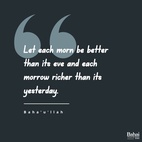


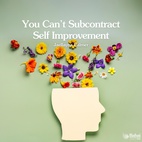
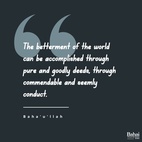
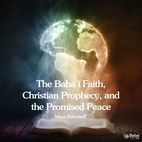
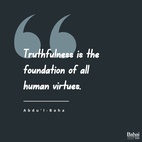

Comments
Sign in or create an account
Continue with Facebookor